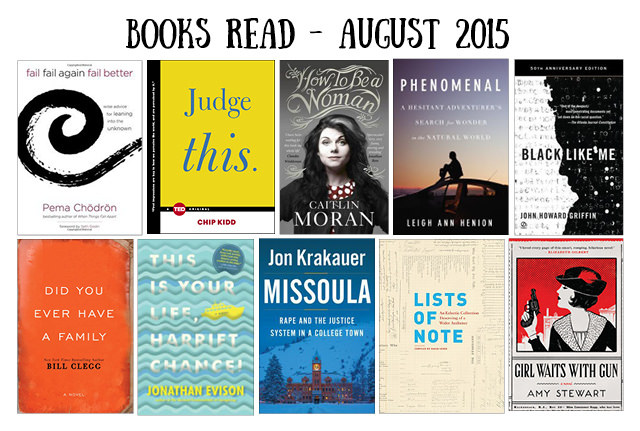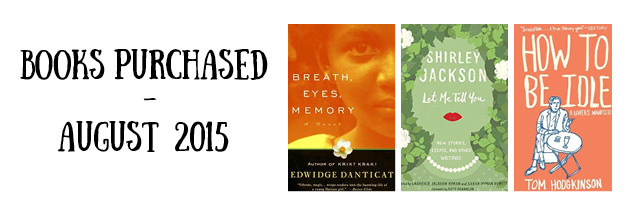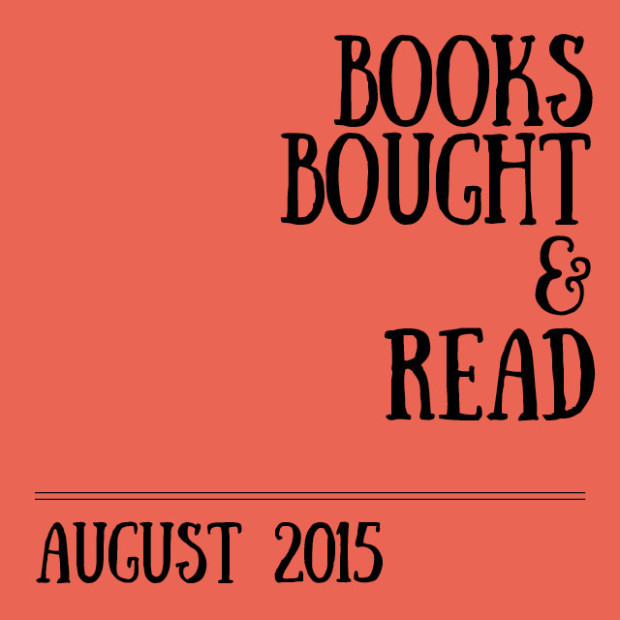I don’t think I’ve ever been sad to see August end. I enjoy summer and I try to make the most it, but I’m an autumn girl at heart and September is my favorite month of the year. I’m so excited for all manner of autumn coziness, including cuddling up with a mug full of a hot beverage and reading a good book. Before I drift too far into this dream (it’s still in the 80s in NYC), let’s take a look at the books that filled up my August days and nights.

Books Read: 10
Already Reviewed:
- Phenomenal by Leigh Ann Henion
- Girl Waits With Gun by Amy Stewart
- Did You Ever Have a Family by Bill Clegg
- Fail Fail Again Fail better by Pema Chödrön
FICTION
This is Your Life, Harriet Chance! by Jonathan Evison: This one didn’t work for me, which was disappointing. It’s a short, fast paced novel jumping forward and backwards in time, and it attempts to cover a great deal: the difficulties of aging, caring for people with memory loss, mother/daughter relationships, rape & sexual abuse, forgiveness, women’s fulfillment via a career vs. homemaking, alcoholism, adultery. It left me with one impression: Too Much. I might have considered not finishing it, but it was so short and fast that I decided to stick it out and see if the ending redeemed it. It didn’t. Instead what I found at the very end of the novel was a few “profound” thoughts about life and how to live it that just seemed manufactured and manipulative – as though they were an attempt to save a poorly executed story and tie it up nicely.
NON-FICTION
A few weeks ago while browsing a book store I saw another TED Talk book (I just read The Art of Stillness): Judge This by Penguin Random House book designer Chip Kidd. He’s not my favorite book designer, but I enjoy his work. The premise of this one seemed fun – he states that good design exists on a sliding scale between clear and mysterious – in some cases we need very clean, clear design, and some designs call for mystery and intrigue. His TED Talk and this book attempt to teach the reader to think about design critically and begin to judge whether designs are successful for themselves. Unfortunately, this one didn’t quite work for me either – it felt disjointed and not very insightful, the first half in particular. He’s attempting to provide a wide variety of design critiques – from print to packaging to product, but it’s a bit too all over the place for such a short book. The product designs especially felt out of place, and then he talked about the ALS Ice Bucket challenge which, while wonderful and an amazing cause, is a viral social movement idea/concept, not a “design” in the way the other items were, and it felt strange to include in a short book about graphic design. I didn’t regret reading this one, because it’s short and the second half where he speaks about his own designs redeems it a bit, but I’m glad I got it from the library.
I received a galley of How to Be a Woman by Caitlin Moran a few years ago when it was published, but it just didn’t click with me. I admit that I didn’t give it a very long tryout — I think I put it down after about 10-20 pages. But then I heard Caitlin Moran on an episode of Nerdette, and she was so funny and wise that I decided to give her books another go. I had long ago donated the galley, so I decided to get the audiobook edition on Audible. That was the right choice: her personal stories and sense of humor resonated much better with me when I could hear her voice delivering them. There’s no perfect book on Feminism (as Roxane Gay points out in her own excellent book on Feminism), and I saw a lot of criticism of this one in the GoodReads reviews, specifically about a few language choices she uses when referring to groups that are marginalized or discriminated against. I don’t want to get into all of that in a mini-review, but I think this one is worth reading (or listening to), despite the imperfections.
I’ve been reading a lot of recently published books on social justice in the past year, like Just Mercy, Citizen, and Between the World and Me. To expand on what I’ve learned from these powerful and important books, I decided to listen to the audiobook of Black Like Me by John Howard Griffen. By altering his light skin through medicine, extreme tanning, and oils, as well as shaving his head, Griffen was able to travel through the American South at the beginning of the Civil Rights movement while passing for a black man, and to share his experience as a man who found himself immediately treated differently — and belonging to a separate and unequal class — based only on his skin color. It’s a very personal account of the Civil Rights movement. It’s a testament to some of the progress we’ve made – but it’s also a sobering reminder of just how bad things were within the lifetime of many people who are still alive. And there is still so much work we need to do. I highly recommend reading his account, in print or via the wonderfully narrated audiobook.
It’s hard to know what to write about Missoula by Jon Krakauer. I’ve touched on it in a few weekly recap posts while I was listening to the audiobook. It’s extremely depressing. It’s anger-inducing. And it’s so important. Before reading it, I was aware of how incredibly prevalent rape and sexual assault are in the US, but I didn’t really have a good understanding of the full spectrum of horrific problems victims face in the aftermath, both from legal and social perspectives. This book was eye-opening, and I think it should be required reading.
Lists of Note is a collection of interesting and/or historically important lists from authors, scientists, politicians, and other public figures, assembled and introduced by Shaun Usher. It’s very similar to his excellent Letters of Note, which I read & reviewed earlier this year. My particular favorites in this collection were (including a link to where they can be read online):
- George Perec’s attempt to list every single thing he ate and drank in the year 1974.
- Benjamin Franklin & Edmund Wilson‘s respective list of terms for drunkenness.
- The rules of the Immaculate Heart College Art Department.
- A list of possible character & novel names kept by Charles Dickens.
- F Scott Fitzgerald’s list of things to worry about, compiled in a letter to his daughter.
- A list of birds President Teddy Roosevelt saw on the white house grounds & Washington D.C. while he was in office, assembled by him as a contribution to a naturalist’s field guidebook.

On one hand, I am proud of myself for only buying three books in August. On the other hand, MOAR BOOKS. I think September will hold a few more purchases, as I tend to get splurgy with books during my birth month. In August, however, I was very excited to pick up Let Me Tell You, a book of previously uncollected fiction & non-fiction writing by Shirley Jackson. What a treat that will be to read. As I mentioned above, this year I’ve been pretty good about reading non-fiction books about social justice, mostly from diverse authors. But I haven’t been reading as many novels or works of fiction by diverse authors. I picked up Breath, Eyes, Memory by Edwidge Danticat to start to rectify that. And finally, I saw the book How to be Idle while browsing — appropriately enough — Idlewild Books. It’s a little “book of hours” exploration into the ways to enjoy a day.
//
Cheers to Autumn, whenever it decides to visit NYC or your part of the world! What were the best books you read in August?

Yay for September birthday months! Here’s how we reduce our guilt. I’ll buy books for you and you buy books for me, but to save on shipping we’ll just keep them and share reviews. Genius, right?
You got some good reading in for August, and have once again reminded me I need to get on the audio of Missoula. Maybe I’ll use a credit and get it next.
Also, LETTERS OF NOTE sounds like this OCD-Anal retentive girl’s dream! ;)
That sounds like a wonderful idea to me! And YES to September birthdays! It’s the most wonderful month. What day is yours?
I’m so glad I read Missoula, as tough as it was emotionally. Do I remember right that you also have a print copy? I can picture you wanting to mark a lot of things in it to refer back to – that was the only downside of the audiobook. But the narration is fantastic, and I’m glad the audiobook helped me get to it faster than I would have in print.
Also – sidenote about comments & having to tick the box to be notified: I’ve been pondering the idea of switching to Disqus. I think it would be better for most of my readers, especially the ones like yourself (and many others) who aren’t on WordPress and don’t get the WordPress alert. I resisted it for a while because I don’t like how Disqus hides the ability to comment without signing up for Disqus — to comment as a guest. They let you do it, but it’s so buried/hidden that I doubt many people who want to do it can find that option. I didn’t want to alienate my family members, who don’t have blogs / commenting accounts. But now that I’m not posting as many travel posts, their comments have slowed down anyway. And I can just make sure my Mom knows how to comment as a guest on Disqus.
Anyway – I’m rambling, but it’s all to say that I think I’m ready to move to Disqus – looking over the last 100 or so comments I’ve gotten, I think most of those people have Disqus accounts. So easier times ahead on Books, the Universe & Everything! :D
I”m 14, when are you?
That is the downside of audio and it’s a big one, because I have zero memory for things. I sometimes try and bookmark, but that can be a pain, or impossible if you’re driving. Someone should invent a way to bookmark with voice-command. Get on that, make your millions. :)
So WordPress is like Disqus in that users don’t need to sign up? I”m sure there are pros and cons of both. I have one friend who had a ton of trouble signing in as a guest. I’m not even sure if I got that all figured out. It really shouldn’t be that hard. I hear you about having issues each way, but if people want to comment they will figure it out. I just feel like a mo when I don’t remember. But you all just have to put up with follow-up comments. :)
Mine’s the 24th. :D
I think you’re right – if people want to comment they will figure it out. And I like that it’s a bit more conductive of conversations.
Until I make the big switch – I absolutely do not mind follow up comments when you forget to check the box. :D
I think I must have been goofy on the juice when I wrote that comment. It makes zero sense. In any event, I wasn’t trying to convince you to change, I think there will be issues with each, you should use what you (and your mom) prefer. The rest of us will figure it out. Though yes, you may have to put up with multiple comments from those of us with short-term memory loss. :)
Sigh. Commenting again because I think I forgot to hit the follow-up comment notification box.
This might sound terrible but I’m glad Harriet Chance didn’t redeem itself. I was so angry when the abuse was being revealed I had to stop. I couldn’t finish the book.
I am trying to bring myself to read Missoula – I know it needs to be read but I need the mental strength prepared.
Glad you tried the Moran book again with better results!
Hahaha it doesn’t sound terrible to me – I can totally relate. Kind of the way I feel when I read other blogger’s negative reviews of galleys I decided not to read – it makes me feel better for deciding to pass. But this one was so frustrating – I haven’t disliked a novel as much in a long time.
Missoula is really hard, and it definitely will hit some people harder or differently than others. It didn’t devastate me as much as some other tough reads – I didn’t sob, or even cry – but it made me really, really angry and upset.
Boy, I’m a huge Jonathan Evison fan, so I’m super bummed about Harriet Chance. I started it and didn’t finish, which is a little heartbreaking considering how much I loved Revised Fundamentals of Caregiving. Sigh, can’t win ’em all.
This was my first by Jonathan Evison, and it was so sad that it was so majorly disappointing. I won’t let it stand in the way of trying his other novels though – I definitely need to read Revised Fundamentals of Caregiving.
Judge This sounds interesting so I’m sorry it fell flat for you. I took some design classes in high school. I get the basic concepts, but I’m always intrigued by the ways design both draws us in and sends us to find something else!